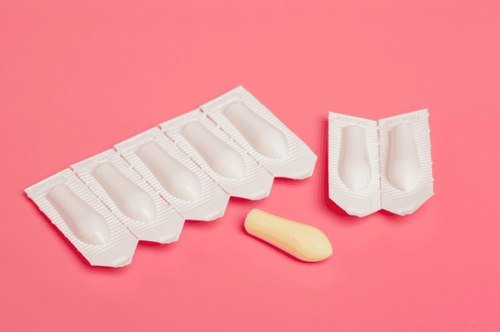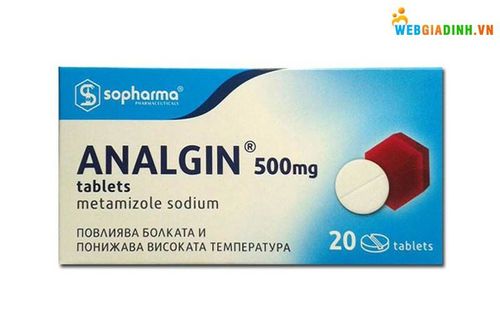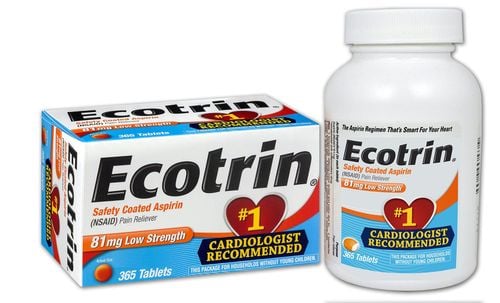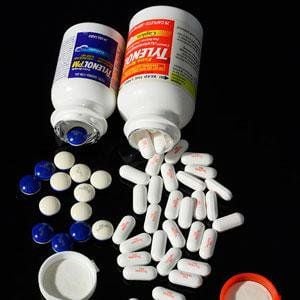When the child has a fever over 38.5 degrees Celsius, it is necessary to reduce the fever in time to avoid prolonged high fever. However, there are many children with fever who refuse to drink or take fever-reducing medicine, they will vomit, children with high fever make it difficult to take medicine...so antipyretic drugs should be inserted into the anus to reduce fever for children.
1. Advantages and Disadvantages of Rectal Antipyretic Suppositories
Fever is not a disease but a symptom of many illnesses. When a child has a high fever, antipyretic medication is needed. There are two ways to reduce fever with medication: oral antipyretics and rectal suppositories.
Rectal antipyretic suppositories have their advantages and disadvantages. The advantages of this type of medication are:
- Rectal antipyretic suppositories are very convenient, especially when the child is sleeping and has a high fever. The suppository can be inserted into the rectum without waking the child, helping to reduce the fever and prevent seizures, which can be dangerous to the child's nervous system.
- Rectal antipyretic suppositories contain paracetamol in different dosages and are formulated with excipients that can melt at body temperature. Therefore, when using rectal antipyretic suppositories, they dissolve quickly and remain in the necessary position, not being pushed out by the anal sphincter.
- The rectal venous system is thick and has a large blood circulation, so the absorption of antipyretic medication through this route is very effective. Additionally, the rectal veins go directly into general circulation, bypassing the liver, which means the medication is not destroyed in the liver and reduces the burden on the liver for detoxification. Furthermore, rectal antipyretic suppositories avoid interaction with the digestive system, especially in children with fever and gastrointestinal damage. Moreover, rectal antipyretic suppositories are not affected when the child has seizures or vomiting, making them more effective than oral medication.
However, rectal antipyretic suppositories also have certain disadvantages, so it is important to use them appropriately and safely for children. The disadvantages of rectal antipyretic suppositories are as follows:
- Rectal antipyretic suppositories are absorbed directly into the blood, but they have a slower and longer-lasting effect compared to oral antipyretics. Additionally, because they are inserted into the rectum, parents may not pay attention to the dosage, leading to overdose, which can affect the child's health and development.
- Although rectal antipyretic suppositories do not pass through the digestive system, they are absorbed into the blood and still affect the body. When paracetamol is overdosed, it can damage liver cells.
- Rectal antipyretic suppositories often cause anal itching, but the degree and frequency of itching depend on the interval between doses and increase over time.
- Rectal antipyretic suppositories can easily cause infections, leading to swelling and pain in the child's anus. If used frequently and for a long time or if the intervals between doses are too short, they can cause rectal inflammation in children. Therefore, if the child shows signs of diarrhea after a few days of using the suppositories, it is necessary to stop immediately.
Trắc nghiệm: Sự phát triển tinh thần, vận động của bé thế nào là đúng chuẩn?
Khi nào bé biết nói, biết hóng chuyện hay biết cầm cốc là "đúng chuẩn"? Điểm xem bạn biết được bao nhiêu mốc phát triển tinh thần, vận động "đúng chuẩn" của bé nhé!The following content is prepared under supervision of Thạc sĩ, Bác sĩ y khoa, Ma Văn Thấm , Nhi , Phòng khám Đa khoa Vinmec Dương Đông(Phú Quốc)

2. When to Use Rectal Antipyretic Suppositories for Children?
As a common symptom in children, when a child's fever exceeds 38.5°C, it is necessary to reduce the fever promptly to avoid prolonged high fever. To reduce fever, there are two ways to use medication: oral antipyretics and rectal suppositories. So, when should rectal antipyretic suppositories be used for children? Many children with fever refuse to take or vomit after taking antipyretic medication, making it difficult to administer the medication, especially when the fever is high. In such cases, rectal antipyretic suppositories should be used to reduce the child's fever.
In cases where the child only has a mild fever and can take oral medication, oral antipyretics should be used as they are faster and more suitable. Additionally, when the child has a fever, the room should not be closed; it should be ventilated with open windows and fans to allow air circulation. Do not cover the child with blankets or let them lie close to the mattress or mat, as this can prevent heat from escaping from the skin in contact with the mattress or mat.
3. Precautions When Using Rectal Antipyretic Suppositories for Children
To use rectal antipyretic suppositories safely and effectively for children, the following basic precautions should be taken:
- Rectal antipyretic suppositories should be stored at a cold temperature, so keep them in the refrigerator at a temperature of 2-8°C. Before using the suppository to reduce the child's fever, check that the suppository is firm enough for easy insertion into the rectum.
- After removing the suppository from its packaging, insert it into the rectum immediately. Once removed from its packaging, the suppository can melt quickly, leading to insufficient dosage to reduce the fever.
- When using rectal antipyretic suppositories, do not use any additional oral medication containing paracetamol, as the suppository already contains paracetamol, which can easily lead to overdose, causing rapid temperature reduction and drug poisoning.
- Before inserting the rectal antipyretic suppository, parents should clean the child's anus thoroughly, wash their hands with soap, and position the child's buttocks upward for easy insertion. Gently insert the suppository into the child's rectum and hold the child's buttocks together to prevent the suppository from falling out for about 2 minutes.
- Do not use rectal antipyretic suppositories frequently to reduce the child's fever and pay attention to the intervals between doses to ensure effective fever reduction.
- In particular, rectal antipyretic suppositories should not be used for children who are allergic to paracetamol or those with severe liver disease, diarrhea, anal-rectal dermatitis, and rectal bleeding. In cases where the child has constipation or anal-rectal conditions, rectal antipyretic suppositories should not be used, as abnormal rectal mucosa can affect the absorption of the medication, reducing its effectiveness in reducing fever.
In addition to using antipyretic medication, it is important to regularly check the child's temperature when they have a fever. If the child's fever exceeds 38.5°C, to increase the effectiveness of the medication, parents should remove excess clothing, give the child plenty of fluids, provide a suitable diet (preferably liquid and soft foods), and place the child in a well-ventilated area.

If the child's fever remains high 30 minutes to 1 hour after taking medication and cooling measures, take the child to the nearest medical facility for timely examination and treatment to avoid dangerous complications. Children aged 6 months to 3 years are particularly susceptible to respiratory issues, respiratory infections, skin conditions, and gastrointestinal infections. Parents should pay special attention to caring for and providing adequate nutrition for their children.
The Pediatrics Department at Vinmec International General Hospital is a trusted address for examining and treating common conditions in infants and young children, such as viral fever, bacterial fever, otitis media, and pneumonia. With modern facilities, medical equipment, and a sterile environment that minimizes the risk of infection, Vinmec ensures customer satisfaction and is highly regarded by healthcare experts with:
- A team of pediatric specialists: Including highly qualified experts (professors, associate professors, doctors, masters) with extensive experience, having worked at major hospitals such as Bach Mai and 108. The doctors are well-trained, professional, empathetic, and understand children's psychology. In addition to domestic pediatric specialists, the Pediatrics Department also includes foreign experts (Japan, Singapore, Australia, USA) who are pioneers in applying the latest and most effective treatment protocols.
- Comprehensive services: In the field of pediatrics, Vinmec provides a range of continuous medical services from Neonatology to Pediatrics and Vaccination, according to international standards, to help parents care for their children's health from birth to adulthood.
- Advanced techniques: Vinmec has successfully implemented many advanced techniques to effectively treat complex pediatric conditions, such as neurosurgery, and hematopoietic stem cell transplantation for cancer treatment.
- Professional care: In addition to understanding children's psychology, Vinmec pays special attention to creating a playful environment for children, helping them feel comfortable and familiar with the hospital environment, cooperating in treatment, and improving the effectiveness of medical care.
Please dial HOTLINE for more information or register for an appointment HERE. Download MyVinmec app to make appointments faster and to manage your bookings easily.














